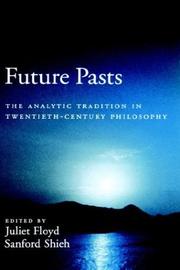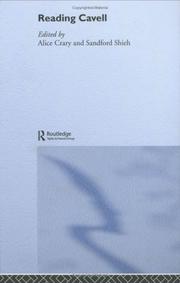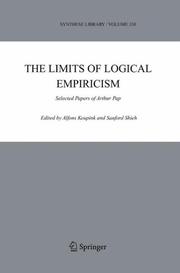| Listing 1 - 9 of 9 |
Sort by
|
Book
ISBN: 9781108946858 9781009468145 9781108925099 Year: 2024 Publisher: Cambridge Cambridge University Press
Abstract | Keywords | Export | Availability | Bookmark
 Loading...
Loading...Choose an application
- Reference Manager
- EndNote
- RefWorks (Direct export to RefWorks)
Responding to Russell is a constant throughout Wittgenstein's philosophizing. This Element focuses on Wittgenstein's criticisms of Russell's theories of judgment in the summer of 1913. Wittgenstein's response to these criticisms is of first-rate importance for his early philosophical development, setting the path to the conceptions of proposition and of logic in Tractatus Logico-Philosophicus. This Element also touches on further aspects of Wittgenstein's responses to Russell: the rejection of Russell's and Frege's logicisms in the Tractatus, the critique of Russell's causal-behavioristic philosophy of mind in Wittgenstein's 'middle' period, the Russellian origins of notions of privacy dialectically treated in Philosophical Investigations, and the discussion of 'surveyability' of mathematical proof in Remarks on the Foundations of Mathematics, which is, again, a response to Russellian logicism.
Digital
ISBN: 9781108946858 Year: 2024 Publisher: Cambridge Cambridge University Press
Abstract | Keywords | Export | Availability | Bookmark
 Loading...
Loading...Choose an application
- Reference Manager
- EndNote
- RefWorks (Direct export to RefWorks)
Book
ISBN: 1108944213 1108946852 1009468146 Year: 2024 Publisher: Cambridge : Cambridge University Press,
Abstract | Keywords | Export | Availability | Bookmark
 Loading...
Loading...Choose an application
- Reference Manager
- EndNote
- RefWorks (Direct export to RefWorks)
Responding to Russell is a constant throughout Wittgenstein's philosophizing. This Element focuses on Wittgenstein's criticisms of Russell's theories of judgment in the summer of 1913. Wittgenstein's response to these criticisms is of first-rate importance for his early philosophical development, setting the path to the conceptions of proposition and of logic in Tractatus Logico-Philosophicus. This Element also touches on further aspects of Wittgenstein's responses to Russell: the rejection of Russell's and Frege's logicisms in the Tractatus, the critique of Russell's causal-behavioristic philosophy of mind in Wittgenstein's 'middle' period, the Russellian origins of notions of privacy dialectically treated in Philosophical Investigations, and the discussion of 'surveyability' of mathematical proof in Remarks on the Foundations of Mathematics, which is, again, a response to Russellian logicism.

ISBN: 019513916X 9780195139167 0199833214 9786610481170 128048117X 0198031882 1423762266 Year: 2001 Publisher: Oxford: Oxford university press,
Abstract | Keywords | Export | Availability | Bookmark
 Loading...
Loading...Choose an application
- Reference Manager
- EndNote
- RefWorks (Direct export to RefWorks)
History of philosophy --- anno 1900-1999 --- Analysis (Philosophy) --- Philosophie analytique --- Analysis, Linguistic (Philosophy) --- Analysis, Logical --- Analysis, Philosophical --- Analytic philosophy --- Analytical philosophy --- Linguistic analysis (Philosophy) --- Logical analysis --- Philosophical analysis --- Philosophy, Analytical --- Language and languages --- Methodology --- Philosophy --- Logical positivism --- Semantics (Philosophy) --- Philosophie analytique. --- Analytische filosofie. --- Analytische Philosophie. --- Analysis (Philosophy).
Digital
ISBN: 9781402042997 Year: 2006 Publisher: Dordrecht Springer
Abstract | Keywords | Export | Availability | Bookmark
 Loading...
Loading...Choose an application
- Reference Manager
- EndNote
- RefWorks (Direct export to RefWorks)
Philosophy --- Metaphysics --- Theory of knowledge --- Philosophy of science --- Logic --- Philosophy of language --- filosofie --- epistomologie --- taalfilosofie --- metafysica --- logica

ISBN: 0415346398 0415346401 9780415346399 9780415346405 Year: 2006 Publisher: London Routledge
Abstract | Keywords | Export | Availability | Bookmark
 Loading...
Loading...Choose an application
- Reference Manager
- EndNote
- RefWorks (Direct export to RefWorks)

ISBN: 1402042981 9048170990 9786610608607 1280608609 140204299X Year: 2006
Abstract | Keywords | Export | Availability | Bookmark
 Loading...
Loading...Choose an application
- Reference Manager
- EndNote
- RefWorks (Direct export to RefWorks)
Arthur Pap's work played an important role in the development of the analytic tradition. This role goes beyond the merely historical fact that Pap's views of dispositional and modal concepts were influential. As a sympathetic critic of logical empiricism, Pap, like Quine, saw a deep tension in logical empiricism at its very best in the work of Carnap. But Pap's critique of Carnap is quite different from Quine's, and represents the discovery of limits beyond which empiricism cannot go, where there lies nothing other than intuitive knowledge of logic itself. Pap's arguments for this intuitive knowledge anticipate Etchemendy's recent critique of the model-theoretic account of logical consequence. Pap's work also anticipates prominent developments in the contemporary neo-Fregean philosophy of mathematics championed by Wright and Hale. Finally, Pap's major philosophical preoccupation, the concepts of necessity and possibility, provides distinctive solutions and perspectives on issues of contemporary concern in the metaphysics of modality. In particular, Pap's account of modality allows us to see the significance of Kripke's well-known arguments on necessity and apriority in a new light.
Logic. --- Logical positivism. --- Positivism. --- Logical positivism --- Analysis (Philosophy) --- Science --- Philosophy --- Methodology --- Logic --- Positivism --- Humanity, Religion of --- Religion of humanity --- Logical empiricism --- Neo-empiricism --- Neo-positivism --- Physicalism --- Positivism, Logical --- Unity of science movement --- Argumentation --- Deduction (Logic) --- Deductive logic --- Dialectic (Logic) --- Logic, Deductive --- Agnosticism --- Deism --- Philosophy, Modern --- Rationalism --- Religion --- Religions --- Realism --- Language and logic --- Meaning (Psychology) --- Reductionism --- Relationism --- Verification (Empiricism) --- Vienna circle --- Intellect --- Psychology --- Reasoning --- Thought and thinking
Book
ISBN: 9781402042997 Year: 2006 Publisher: Dordrecht Springer Netherlands
Abstract | Keywords | Export | Availability | Bookmark
 Loading...
Loading...Choose an application
- Reference Manager
- EndNote
- RefWorks (Direct export to RefWorks)
This volume brings together a selection of the most philosophically significant papers of Arthur Pap. As Sanford Shieh explains in the Introduction to this volume, Pap's work played an important role in the development of the analytic tradition. This role goes beyond the merely historical fact that Pap's views of dispositional and modal concepts were influential. As a sympathetic critic of logical empiricism, Pap, like Quine, saw a deep tension in logical empiricism at its very best, in the work of Carnap. But Pap's critique of Carnap is quite different from Quine's, and represents the discovery of limits beyond which empiricism cannot go, where there lies nothing other than intuitive knowledge of logic itself. Pap's arguments for this intuitive knowledge anticipate Etchemendy's recent critique of the model-theoretic account of logical consequence. Pap's work also anticipates prominent developments in the contemporary neo-Fregean philosophy of mathematics championed by Wright and Hale. Finally, Pap's major philosophical preoccupation, the concepts of necessity and possibility, provides distinctive solutions and perspectives on issues of contemporary concern in the metaphysics of modality. In particular, Pap's account of modality allows us to see the significance of Kripke's well-known arguments on necessity and apriority in a new light. This volume will be of interest to all researchers in the philosophical history of the analytic tradition, in philosophy of logic, philosophy of mathematics, and contemporary analytic metaphysics.
Philosophy --- Metaphysics --- Theory of knowledge --- Philosophy of science --- Logic --- Philosophy of language --- filosofie --- epistomologie --- taalfilosofie --- metafysica --- logica
Digital

ISBN: 9783110203295 9783110139914 Year: 2008 Publisher: Berlin ;; Boston De Gruyter Mouton
Abstract | Keywords | Export | Availability | Bookmark
 Loading...
Loading...Choose an application
- Reference Manager
- EndNote
- RefWorks (Direct export to RefWorks)
| Listing 1 - 9 of 9 |
Sort by
|

 Search
Search Feedback
Feedback About UniCat
About UniCat  Help
Help News
News